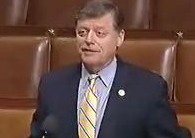The safety and security we enjoy each day isn’t without a price. As the greatest military power in the world, our country must continue to preserve our defense capabilities and support those who put their lives on the line daily. Last week, the House passed, with strong bipartisan support, the Defense Appropriations Act for Fiscal Year 2014 which ensures critical military funding in the coming fiscal year.
In passing this important legislation, both parties in Congress worked together to accomplish the first step in the process to continue funding and support for our military. While the process isn’t over yet, the House looks forward to working with the Senate, which will take up its own version of the bill in the coming weeks, so we can come to an agreement on the final legislation and send to the president for his signature.
Overall cuts were necessary but not easy. However, the House took great care to ensure that any reductions in spending will still preserve military readiness, fund new technologies and adequately arm and equip our troops. The legislation includes a 1.8 percent pay raise for our troops and looks out for the health and well-being of service members, military families and retirees. In particular, the bill prohibits the implementation of an enrollment fee for TRICARE for Life beneficiaries—those aged 65 or older.
Throughout last week’s debate, several amendments were brought to the floor to address changing defense and fiscal priorities. I was very encouraged to see three amendments that dealt particularly with furlough prevention for our valued civilian workers. On Tuesday, I offered an amendment which prevents funds from being used to implement a furlough on Defense Department employees paid from the Working Capital Fund (WCF) if the reason given is sequestration. The legislation provides relief to approximately 180,000 civilian workers across the country, including more than 9,000 at Tinker Air Force Base alone, whose salaries are not paid through direct appropriations, providing exemption from sequester-related furloughs.
In addition, I proudly supported amendments brought by my colleagues to provide other avenues for furlough prevention. Congressman Lee Terry (NE-02) offered an amendment that reduces funding in the Afghanistan Security Forces Fund by $2.6 billion in order to direct $1.6 billion to deficit reduction and $1 billion to offset civilian furloughs. Congressmen Doug Lamborn (CO-05) and Beto O’Rourke (TX-16) presented legislation that prohibits funding in the bill from being used to furlough any civilian employee at the Defense Department. All three amendments passed the House by voice vote Tuesday and are included in the final bill.
I also supported an amendment that prevents the National Security Agency (NSA) from using funds to target or monitor American persons through any electronic communications from a public provider. It also prohibits the NSA from storing such personal information or content.
Congressman Trey Radel (FL-19) offered an amendment that deals specifically with our nation’s current and future involvement in Syria. It will prohibit military involvement in the Syrian civil war unless the action is consistent with the War Powers Resolution and thus, approved by Congress. This simply reasserts the constitutional role of the legislative branch in authorizing U.S. military involvement overseas, and serves as a much needed reminder to the president of the constitutional role played by Congress.
Again, I am proud of this truly bipartisan effort that proves we will take care of our troops both at home and on the battlefield abroad. As the Senate takes up its own version of the bill in the coming weeks, I look forward to full reconciliation of legislation that sustains our valuable defense programs, provides funding for research and development of new technologies and continues to equip troops with all the resources needed to ensure our nation remains safe.



